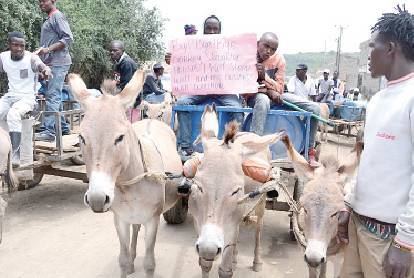Excitement for donkey owners as numbers rise

There is a slow but steady rise in the donkey population in the country amid persistent concerns that the animals are still at risk of extinction given the growing interest from China.
Researchers had released reports revealing donkeys would be wiped out by 2023, owing to high demands for their skins by some Chinese firms which led to the rampant increase in the theft of the animal countrywide.
Africa Network for Animal Welfare Kenya (ANAW) had previously stated that the National Population and Housing Census (2009) recorded the population of donkeys in the country at 1.8 million.
It revealed that the population report (2019) placed the population slightly less than a million stating that since slaughterhouses were opened in 2016 it has greatly impacted the practice of donkey keeping.
With the operation of the abattoirs still being restricted by the government for close to a year now, animal welfare groups have exuded optimism of an increase in population.
Population growth
Emmanuel Mutai from Farming Systems Kenya revealed that since the government closed down abattoirs, the South Rift region has had zero reports of donkey theft, saying the same will improve the annual population growth.
“The annual mean rate of donkeys slaughtered was 5.1 per cent, five times higher than the annual population growth of donkeys which stands at 1.04 per cent but at the moment we should expect a rise if the abattoirs remain closed.”
Speaking yesterday in Njoro, Mutai who also doubles up as a veterinarian said the beast of burden was at risk of extinction if the slaughter continued, adding that farmers had resorted to keeping with animals in their houses.
“It is great to see the animals grazing in public land unlike other seasons, the number of donkeys within Njoro has gone up and we need to maintain that since it increases job opportunities for our youths and women who depend on the animal for daily earnings,” he said.
Bernard Karanja, a donkey farmer, said the animal theft had gone down by a huge percentage after the government banned the slaughter and trade of donkeys.
He said unlike other months where they used to keep donkeys in their houses due to security, farmers can now breathe a sigh of relief.











